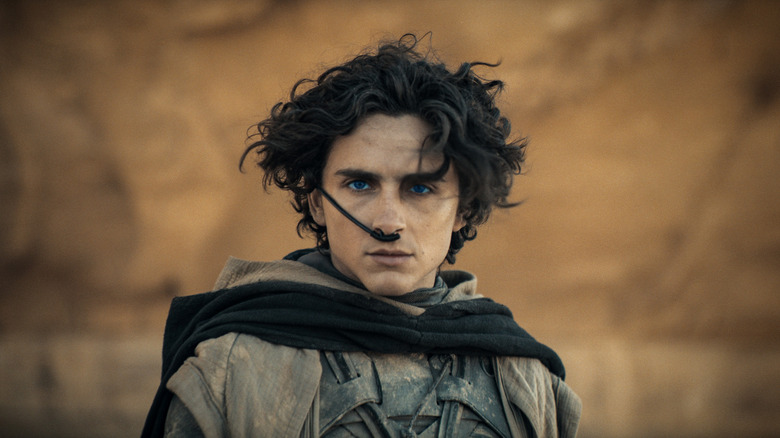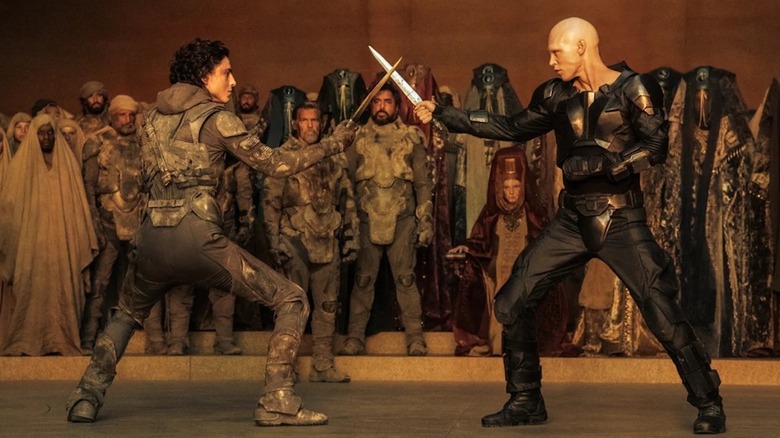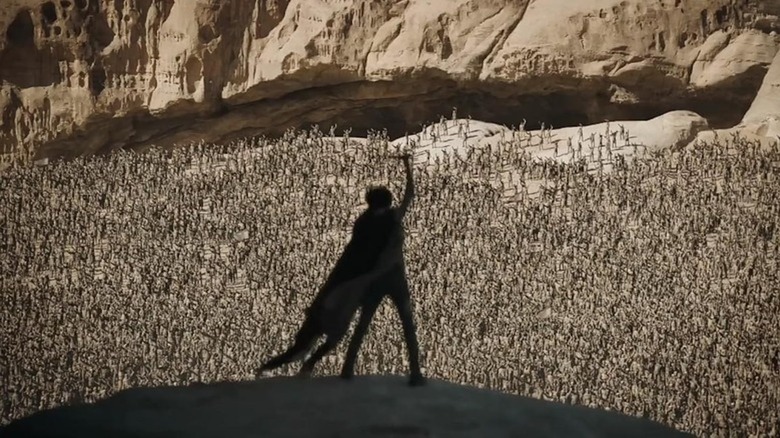Dune Director Denis Villeneuve Hit Back At Critics Of The Films' Length
There isn't a more wearisome topic in the oft-wearisome realm of Film Discourse than the unkillable movie runtime debate. For those who actually care enough about cinema to read up on the wisdom dispensed by the medium's most learned critics and scholars, this superficial subject was succinctly settled when Roger Ebert wrote in his 1992 essay "The Thrill of Breaking the 120-Minute Barrier," "Bad movies are always too long, but good movies are either too short, or just right."
Of course, I've seen good movies that dragged a bit, and bad/disappointing movies that could be vastly improved by an expanded narrative focus. Franchise-launching first installments often fall into that former camp due to an excess of track-laying exposition; James Cameron's "Avatar" sags during its first two acts as he brings us up to the speed on the history/flora/fauna/what-have-you (and what you have is a lot) of Pandora (I'd seriously take an inelegant-yet-mercifully-brief tutorial from Richard Attenborough and Mr. DNA over the not-eye-popping-enough travelog opening 90-minutes of Cameron's epic). As for the latter category, Ridley Scott's 144-minute theatrical cut of "Kingdom of Heaven" plays like a purposeless slog, primarily because –- as we learned via his masterful, 45-minute-longer Director's Cut –- he'd cut out the heart of the narrative.
Rare exceptions aside, Ebert's maxim holds true across the board. And while it's undeniable that blockbuster movies are getting longer, many of these tentpoles are drawing from pre-existing novels and comic books that are awash in multi-character arcs. The spirit of the material must be served.
This is vital for a filmmaker like Denis Villenueve, who strives to make narratively complex epics that breathe. He bristles at this knee-jerk complaint that blockbuster runtimes are out of control because he believes the audience and critical response indicate both "Dune" chapters were perfectly paced.
Villeneuve feels the Dune movies were as long as they needed to be
In an interview earlier this year with The Times, Villenueve was asked about the most recent iteration of the unkillable runtime gripe. In 1992, Ebert was responding to moviegoers put off by the daunting three-hour-plus lengths of "Dances with Wolves" and "JFK" (both of which were commercial successes). Throughout the 2000s, runtime scolds wrung their impatient hands over the expanding scope of the Harry Potter films (which matched the steadily increasing page count of J.K. Rowling's books), and they carped anew a decade later when the MCU closed out its "Infinity Saga" with the 181-minute "Avengers: Endgame" (currently the second highest grossing movie of all time).
Last year, the runtime panic button got smashed when two of our greatest living filmmakers, Christopher Nolan and Martin Scorsese, breached the three-hour threshold with their masterpieces "Oppenheimer" and "Killers of the Flower Moon." Are studios perhaps overindulging these artists? Did these movies really have to be that long?
Villenueve heard this criticism when "Dune: Part Two" clocked in at a reasonable 166 minutes, and he quickly brushed it off. As he told The Times:
"This was the only way I could succeed. Also, think of 'Oppenheimer.' It is a three-hour, rated-R movie about nuclear physics that is mostly talking. But the public was young –- that was the movie of the year by far for my kids."
Wait, young people, the prized moviegoing demographic of every studio in Hollywood, aren't buying this movies-are-too-long horse pucky?
Dune proves the kids love their three-hour runtimes
Villenueve didn't cite any specific statistical studies to support the thesis he put forward in The Times, but I want to believe he's right. Certainly, the $711.8 million global gross of "Dune: Part Two," driven in large part by teens and 20-somethings, is powerful evidence to back up his claim. "There is a trend," said Villenueve. "The youth love to watch long movies because if they pay, they want to see something substantial. They are craving meaningful content."
Interestingly, all the way back in 1992, Ebert appended his rule thusly: "Besides, with a longer movie, you get more for your money." He was joking at the time, but today's youth seems to take this notion very seriously. The box office certainly backs this up.
Alas, this debate will likely rage anew over the June 28 weekend, as Kevin Costner's three-hour "Horizon: An American Saga –- Chapter 1" looks to open to very disappointing, if not disastrous, numbers. The lesson here should be that adults are still leery of returning to theaters three years after the release of the first COVID-19 vaccine, but why have a nuanced, fact-based conversation when you can dredge up an argument that's been bunk since the silent era?


